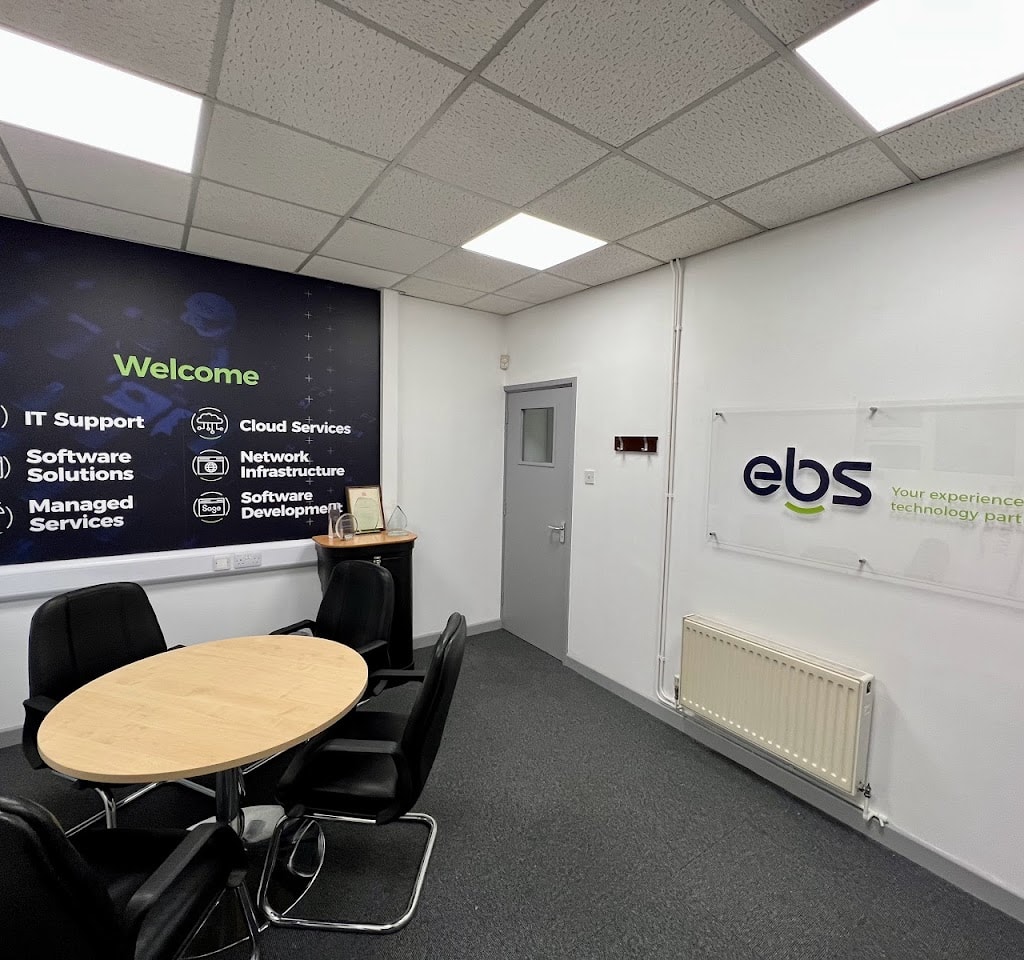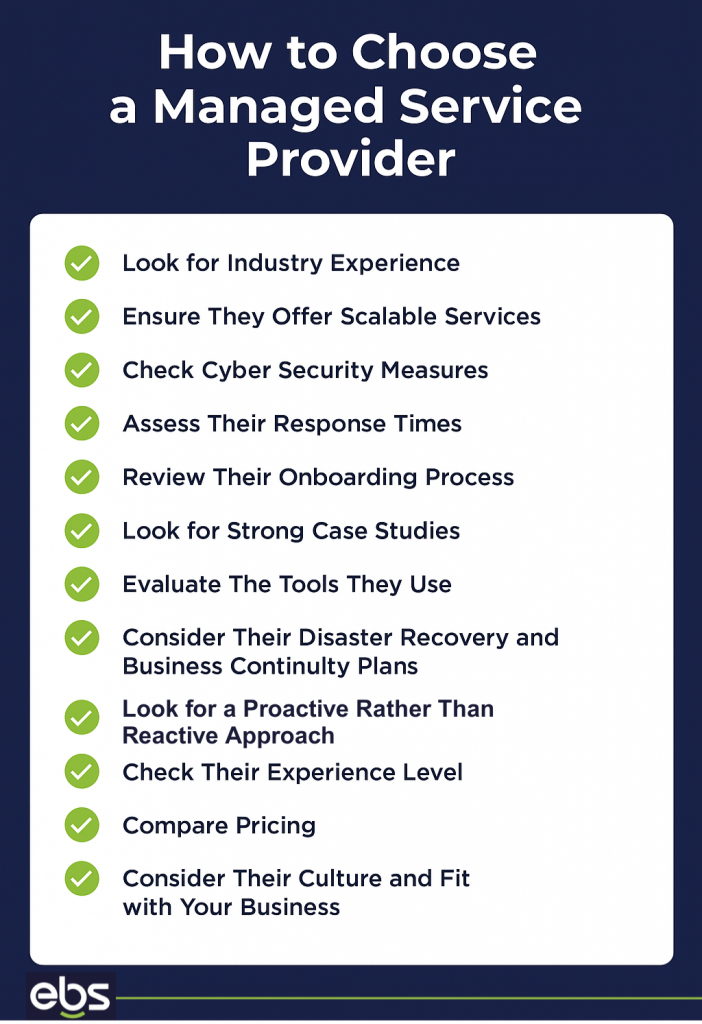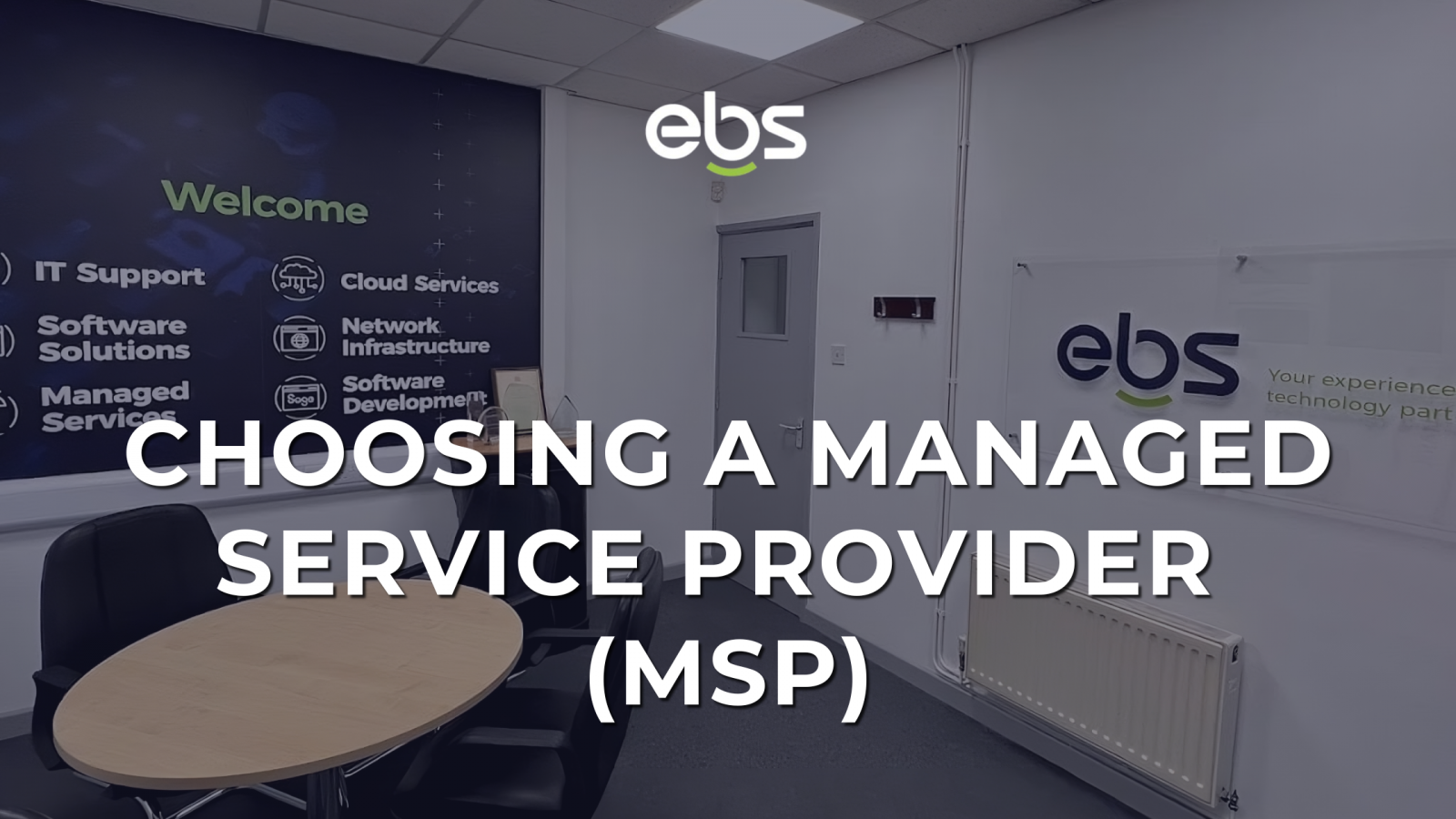Emma Davies
Choosing a Managed Service Provider (MSP) is a big decision. Whether you’re scaling up, don’t have an internal IT team, or are simply tired of recurring tech issues, the right MSP can make all the difference.
After four decades of delivering IT solutions at EBS, we’ve learned what UK businesses really need from their IT provider: reliability, responsiveness, and technology that supports business operations long-term. In this guide, we’ll walk you through 12 key tips for choosing a Managed Service Provider that delivers on all three.
What is a Managed Service Provider (MSP)?
A Managed Service Provider (MSP) is a third-party provider that manages your IT infrastructure and support on an ongoing basis. Rather than only stepping in when something breaks, an MSP acts as a reliable partner, taking a proactive approach – monitoring, maintaining, and optimising your systems.
This is a key difference compared to break-fix support, which is purely reactive. With break-fix, help is only provided after a problem has occurred – by which point it could have disrupted your business operations. In contrast, an MSP works to prevent issues before they impact your business.
Related Article: Break-Fix vs. Managed IT Services

12 Essential Tips for Choosing a Managed Service Provider
Use these 12 tips to choose a provider that’s the right fit for your business – now and in the future.
1. Look For Industry Experience
When choosing an MSP, it’s worth asking whether they have direct experience in your sector and with businesses of your size. Supporting medium sized businesses requires a different approach to smaller start-ups or large enterprises. Do they understand the pressures you face, the systems you rely on day to day, and the regulatory or operational challenges specific to your industry?
Look for case studies or success stories that reflect both your sector and scale. This is one of the clearest indicators that the MSP can hit the ground running, adapt quickly to your needs, and add real value from day one.
2. Ensure They Offer Scalable Services
As your business grows, your IT support should be able to grow with you. Whether you’re adding new team members, offering more flexible working options, or expanding into new markets, your Managed Service Provider (MSP) should be ready to adapt to your changing needs.
Take, for example, a growing accountancy firm that decides to move to the cloud. What does that mean? Rather than storing files and software on computers in the office, they want to access them securely online, so their team can work just as effectively from home or on the move. A good MSP won’t just carry out the migration – they’ll recommend a cloud solution that scales easily as the team grows, with no need for costly infrastructure upgrades.
The MSP’s support model should be just as flexible – ready to onboard new staff quickly, extend coverage where needed, and adjust services without disruption. Scalability should be built into the partnership from the start.
3. Check Cyber Security Measures
How confident are you that your business is protected against today’s threats? A strong MSP won’t just react when something goes wrong – they’ll work proactively to secure your network, devices, and data around the clock.
One clear way to demonstrate commitment to strong data security practices is through Cyber Essentials, a UK government-backed scheme that helps businesses protect themselves against common cyber threats.
Not only does this give you a solid foundation for cyber security, 69% of businesses have reported that it increased their market competitiveness. Your MSP should both hold this certification themselves and be able to actively support you in achieving it.
Here are a few questions worth asking:
- How do you monitor and protect against cyber threats?
- Can you help us meet compliance standards relevant to our industry?
- What’s your plan if something goes wrong – how quickly will we know?
- Are you Cyber Essentials certified?
- Can you guide us through achieving Cyber Essentials or Cyber Essentials Plus?
4. Assess Their Response Times
When something goes wrong – or even when you just have a quick question – you need to know your MSP will be there for you. Effective communication is more than just answering the phone. It’s about clear expectations, fast response times, and feeling supported whenever you reach out.
Service Level Agreements (SLAs) should clearly outline how quickly they respond to and resolve issues. These aren’t just technical terms – they’re promises. Make sure the MSP explains their SLAs in plain language and shows you how they track performance.
For example, an MSP might have an SLA that says critical issues, like your systems going offline, will receive a response within 15 minutes, with a resolution target of under four hours.
5. Review Their Onboarding Process
A reliable MSP will have a clear, structured onboarding process that makes the transition smooth and stress-free.
Ask how they handle moving from your existing setup. Will they work directly with your current provider? How do they ensure nothing gets missed?
A professional MSP might begin by auditing your existing systems, gathering all the necessary access and documentation, and agreeing a go-live date. They’ll usually schedule the transition outside of peak business hours, and set clear milestones – such as ensuring all users are migrated and critical systems tested before anything switches over.
6. Look for Strong Case Studies
A well-established MSP should have no problem showcasing the results they’ve delivered for other businesses – and their website is often the best place to start. Look for clear, detailed case studies that highlight how they’ve supported clients through specific challenges, whether that’s enabling secure remote working, improving system reliability, or strengthening cybersecurity.
They show not only the outcomes an MSP can achieve but also how they work in partnership with businesses over time. Pay attention to the language used – do their clients talk about fast responses, long-term support, or going above and beyond?
7. Evaluate The Tools They Use
When choosing an MSP, it’s important to understand the tools and communication channels they rely on to deliver their service.
Do they use a structured ticketing system to manage and track support requests? Can you access a customer dashboard to check progress or view reports?
These features may sound small, but they can make a big difference to how smoothly your support experience runs.
It’s also worth checking whether the provider is a recognised partner of trusted software vendors like Microsoft. A certified Microsoft Partner, for example, is more likely to have the technical expertise needed to support your cloud services, email systems, or collaboration tools effectively.
8. Consider Their Disaster Recovery and Business Continuity Plans
No one wants to think about worst-case scenarios – but a good MSP does. A reliable MSP should be able to explain how they back up your systems, how often those backups are tested, and how quickly they can restore everything if something goes wrong.
At EBS, we’ve seen first-hand how important these plans are. When the Institute of Leadership’s offices were hit by a severe flood, we acted quickly to recover their on-premise servers and restore operations. From there, we helped them move into the cloud – a much safer, more flexible environment no longer vulnerable to physical damage.
Read the full story to see how we turned a major disruption into a lasting upgrade.
9. Choose a Strategic Partner
A great MSP should do more than repairs. They should be a strategic partner – someone who understands your business, keeps you ahead of risks, and helps you make informed decisions about your technology and IT strategy.
Look for a provider that takes a proactive approach. Are they offering regular reviews and forward-thinking recommendations? Do they talk to you about future upgrades, upcoming security needs, or better ways to improve operations? The best MSPs keep your business objectives in mind and help you use IT as a tool to drive growth, not just maintain what you already have.
10. Check Their Experience Level
Experience matters, especially when you’re trusting someone else with your business-critical systems. A well-established MSP brings not just technical know-how, but a depth of insight gained from working across different industries, challenges, and technologies over time.
Start by looking into how long they’ve been delivering managed services. Are they relatively new to the space, or do they have a long-standing track record?
It’s also worth exploring the experience of their team. Many reputable providers will share staff profiles or even introduce key contacts during early conversations.
11. Compare Pricing
Cost is always a consideration when choosing an MSP, but it’s not just about the number on the invoice. What really matters is understanding what you’re paying for and whether that investment delivers genuine value to your business.
Transparency is key. A trustworthy MSP will outline exactly what’s included in your agreement: how many hours of support you receive, which services are covered (such as network management, cybersecurity, or cloud support), and what falls outside of scope. There should be no hidden extras, no sudden fees, and no vague descriptions.
12. Consider Their Culture and Fit with Your Business
The best IT support doesn’t feel like an external service, it feels like an extension of your team. When choosing a Managed Service Provider, it’s important to consider whether they align with your company’s values, ways of working, and communication style.
A good MSP should be approachable, honest, and easy to collaborate with. Do they listen to your concerns, explain things clearly, and treat your success as their priority?
Beyond technical capability, ask yourself: do they take time to understand how your business operates? Are they the kind of people you’d feel comfortable calling during a crisis?

For Managed IT Support Built Around Your Business
IT shouldn’t be a drain on your time or budget. At EBS, we take the stress out of IT by understanding your business first – so everything we deliver is built around how you work.
- Tired of waiting for help when things go wrong? Our 98% customer satisfaction score shows that we solve problems fast, communicate clearly, and take the pressure off when it matters most.
- Working with systems that hold you back? As trusted partners of Microsoft, HP, and more, we give you access to powerful, scalable tools – plus the expertise to make them work for your business.
- Concerned about cyber security? We use award-winning tools and proactive monitoring to cover every layer of your IT environment – devices, networks, data, users – giving you peace of mind that your business is protected around the clock.
- Not sure where your IT is going with your current provider? We keep you in the loop with clear, jargon-free communication and regular quarterly account manager meetings.
In short: we turn IT roadblocks into opportunities, so your business can move forward with confidence.
Find out why over 2,000 users trust EBS for reliable, forward-thinking managed IT support.

Frequently Asked Questions
Let’s go through some common questions on choosing a managed service provider.
Are Managed Service Providers Worth It?
Yes – here’s what makes working with a managed service provider worth it:
• Reduced downtime costs – Outages, slow systems, and disruptions cost more than most businesses realise. MSPs help you avoid them.
• No need for a full in-house team – Gain access to a wide range of expertise without the salaries, training, and overheads.
• Better value from your technology – MSPs ensure you’re getting the most from your existing systems, reducing waste and unnecessary upgrades.
• Fewer hidden costs – With clear deliverables and defined SLAs, you’re not left guessing or paying extra for basic support.
What Are the Types of Managed IT Services?
The types of IT services that can be included by an MSP include:
• Infrastructure and Network Management
• Managed Security Services
• Cloud Services
• Data Backup and Disaster Recovery
• IT Help Desk and End-User Support
• IT Consulting and Strategy
• Compliance and Risk Management
• Technology Procurement
• Communications Management
• On-Site IT Services
• Want to dive deeper into each type? Read our guide on the 10 types of managed IT services.

